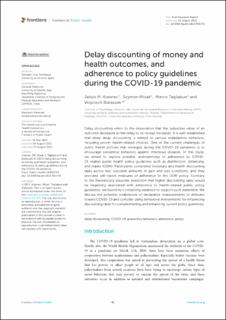| dc.contributor.author | Krawiec, Jakub M. | |
| dc.contributor.author | Mizak, Szymon | |
| dc.contributor.author | Tagliabue, Marco | |
| dc.contributor.author | Białaszek, Wojciech | |
| dc.date.accessioned | 2022-09-28T13:29:41Z | |
| dc.date.available | 2022-09-28T13:29:41Z | |
| dc.date.created | 2022-08-23T23:53:32Z | |
| dc.date.issued | 2022-08-22 | |
| dc.identifier.issn | 2296-2565 | |
| dc.identifier.uri | https://hdl.handle.net/11250/3022330 | |
| dc.description.abstract | Delay discounting refers to the observation that the subjective value of an outcome decreases as the delay to its receipt increases. It is well-established that steep delay discounting is related to various maladaptive behaviors, including poorer health-related choices. One of the current challenges of public health policies that emerged during the COVID-19 pandemic is to encourage preventive behaviors against infectious diseases. In this study, we aimed to explore possible underpinnings of adherence to COVID-19 related public health policy guidelines such as disinfection, distancing, and masks (DDM). Participants completed monetary and health discounting tasks across two outcome amounts in gain and loss conditions, and they provided self-report measures of adherence to the DDM policy. Contrary to the theoretically plausible prediction that higher discounting rates would be negatively associated with adherence to health-related public policy guidelines, we found no compelling evidence to support such statement. We discuss the potential weaknesses of declarative measurements of attitudes toward COVID-19 and consider using behavioral interventions for influencing discounting rates for complementing and enhancing current policy guidelines. | en_US |
| dc.description.sponsorship | Article Processing Charges (APC) for this article were financed by research subsidies from SWPS University (Project Number 22/2022/FRBN/D). | en_US |
| dc.language.iso | eng | en_US |
| dc.publisher | Frontiers Media | en_US |
| dc.relation.ispartofseries | Frontiers In Public Health; | |
| dc.rights | Navngivelse 4.0 Internasjonal | * |
| dc.rights.uri | http://creativecommons.org/licenses/by/4.0/deed.no | * |
| dc.subject | Delay discounting | en_US |
| dc.subject | COVID-19 | en_US |
| dc.subject | Preventive behaviors | en_US |
| dc.subject | Adherence | en_US |
| dc.subject | Policy | en_US |
| dc.title | Delay discounting of money and health outcomes, and adherence to policy guidelines during the COVID-19 pandemic | en_US |
| dc.type | Peer reviewed | en_US |
| dc.type | Journal article | en_US |
| dc.description.version | publishedVersion | en_US |
| dc.rights.holder | © 2022 Krawiec, Mizak, Tagliabue and Białaszek | en_US |
| dc.source.articlenumber | 953743 | en_US |
| cristin.ispublished | true | |
| cristin.fulltext | original | |
| cristin.qualitycode | 1 | |
| dc.identifier.doi | https://doi.org/10.3389/fpubh.2022.953743 | |
| dc.identifier.cristin | 2045509 | |
| dc.source.journal | Frontiers In Public Health | en_US |
| dc.source.volume | 10 | en_US |
| dc.source.issue | 10 | en_US |
| dc.relation.project | SWPS Uniwersytet Humanistycznospołeczny z siedzibą w Warszawie: 22/2022/FRBN/D | en_US |

